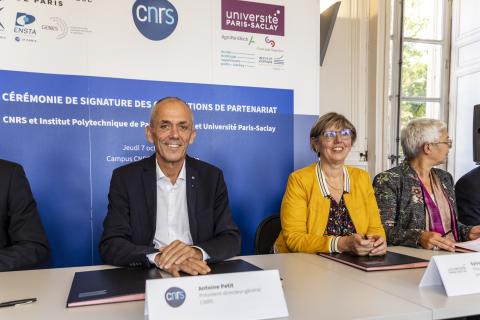
The CNRS and Université Paris-Saclay sign a partnership agreement
The French Centre for Scientific Research (CNRS) and Université Paris-Saclay came together on Thursday 7 October 2021, on the CNRS site at Gif-sur-Yvette, to renew the partnership between the French national research organisation and the academic institution in the Plateau de Saclay area for 2020-2025. By signing this renewed partnership agreement, the heads of the CNRS and Université Paris-Saclay, alongside AgroParisTech, CentraleSupélec, ENS Paris-Saclay and the Institut d’Optique Graduate School, demonstrate their shared ambition to strengthen fundamental research, and increase the innovation potential, renown and appeal of the Saclay area internationally.
The renewal of this partnership agreement comes as part of continued fruitful collaborations between these established players. The signatory institutions have gradually regrouped their scientific assets around the Plateau de Saclay area. Together, they have contributed to the shaping of the area’s new R&D identity, through their campuses located in Gif-sur-Yvette, Bures-sur-Yvette, Orsay, Palaiseau and Saclay. The many new shared buildings and state-of-the-art facilities provide a unique technological potential and boost scientific partnerships.
The scientific partnership between the CNRS and Université Paris-Saclay covers all areas of knowledge. Built around 85 research and support units, half of which involve other higher education institutions, the partnership brings together a scientific community of 8,000 people. The CNRS has contributed to the policy for the Plateau de Saclay area by supporting its partners in the structuring of its research excellence, supported by the French government via the national Investments for the Future programme (PIA).
“Université Paris-Saclay is delighted to sign this partnership agreement with the CNRS. Our collaboration is part of a longstanding history that continues today with excellence in mind, whether it be excellence in our research, or excellence in our cutting-edge collaborations within our shared laboratories,” said Sylvie Retailleau, President of Université Paris-Saclay.

“The shared laboratories in the Plateau de Saclay area represent an exceptional potential for research and innovation. The CNRS strongly supports this potential by assigning it 12% of its permanent staff. Thanks to its excellence and drive, the scientific community represents an undeniable asset in tackling the major social and economic challenges that our societies face today,” explained Antoine Petit, Chairman and CEO of the CNRS.
The research strategies outlined by these key public players in the Plateau de Saclay area focus on fundamental research projects for the benefit of society, with industrial, environmental and societal applications. The combination of the assets and interdisciplinary strengths of the CNRS and Université Paris-Saclay create key research opportunities in a wide variety of disciplines ranging from cybersecurity, Artificial Intelligence, Quantum science, nanotechnology, health, biotechnology, energy and the environment. Together, they actively contribute to increasing the area’s innovation potential.
In a context where international competition in research and innovation continues to rise, the partnership agreement also includes the elaboration and implementation of concerted European and international policies. For Europe, the University will work with the CNRS to share tools, resources and practices in order to strengthen the submission of European projects by researchers and academic staff.
“This partnership agreement illustrates the scientific ambition shared by the University, its Grandes Écoles and faculties, and the CNRS. It will act as a facilitator in the daily lives of our teams and will be an invaluable tool in helping us to progress together on critical societal issues, such as open science, scientific integrity and sustainable development,” explained Sylvie Retailleau, President of Université Paris-Saclay.
